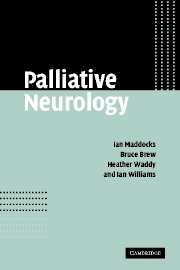Book contents
- Frontmatter
- Contents
- Foreword
- Note on drugs and abbreviations
- Section I Palliative Management
- Section II Major discomforts in advanced neurological illness
- 1 Fatigue
- 2 Problems with muscles and movement
- 3 Bulbar symptoms
- 4 Respiratory symptoms
- 5 Gastrointestinal symptoms
- 6 Urological symptoms
- 7 Pain
- 8 Cognitive, behavioural and psychological symptoms
- 9 Miscellaneous symptoms
- Section III Major neurological conditions requiring palliation
- Section IV Ethical issues
- Section V Appendices
- Index
2 - Problems with muscles and movement
from Section II - Major discomforts in advanced neurological illness
Published online by Cambridge University Press: 08 January 2010
- Frontmatter
- Contents
- Foreword
- Note on drugs and abbreviations
- Section I Palliative Management
- Section II Major discomforts in advanced neurological illness
- 1 Fatigue
- 2 Problems with muscles and movement
- 3 Bulbar symptoms
- 4 Respiratory symptoms
- 5 Gastrointestinal symptoms
- 6 Urological symptoms
- 7 Pain
- 8 Cognitive, behavioural and psychological symptoms
- 9 Miscellaneous symptoms
- Section III Major neurological conditions requiring palliation
- Section IV Ethical issues
- Section V Appendices
- Index
Summary
WEAKNESS
Muscle weakness has a multitude of causes. Some involve genetic or metabolic disturbances affecting the muscle directly, some are caused by interruptions to the transmission of impulses at the neuromuscular junction, still others by abnormalities in the muscle nerve supply. Disuse atrophy with profound weakness may be seen in advanced arthritis or in any other condition where chronic pain enforces immobility. There are numerous uncommon syndromes in which muscle weakness is an important component; many of these will come to a specialist neurologist for elucidation. Some weakness is temporary, recovery of strength often occurs in stroke or very commonly in Guillain-Barré syndrome. Cranial motor and peripheral muscular dysfunction in myasthenia gravis may respond to steroids, immuno-suppressants and either plasma exchange or immunoglobulin infusions as well as thymectomy and the use of pyridostigmine. There are presentations of ‘functional’ weakness (often unilateral and sometimes accompanied by sensory symptoms) commonly of prolonged duration, that are little altered by treatment of any kind, but are not readily assigned to any recognizable neurological diagnosis. This group of disorders reminds us that weakness is a subjective as well an objective and measurable symptom.
More pertinent to this discussion is the weakness, generalized or limited to particular muscle areas, that is associated with progressive neurological diseases such as amyotrophic lateral sclerosis (ALS), Parkinson's disease, multiple sclerosis (MS), the muscular dystrophies and neuropathies and with stroke and cerebral tumour.
The supportive phase
A disability or discomfort that is not amenable to treatment deserves palliation.
- Type
- Chapter
- Information
- Palliative Neurology , pp. 47 - 64Publisher: Cambridge University PressPrint publication year: 2005



